Our People
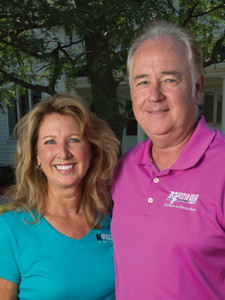
Jackie & David Stewart
As a child, Jackie Kinnard-Stewart, the second youngest of the seven Kinnard children, loved working on the farm. “The three youngest girls were all two years apart. Mom would bundle us all up and take us out to the milking parlor. Back in those days there were always cats in the barn and kittens being born. Dad built the best cat houses in the world! We played in the parlor while mom and dad milked.”
As the children got older, Alvin and Milly encouraged their children to learn. “Mom and Dad gave us a wonderful life. They provided us all with an education, and in return, we came home for the summer and worked on the farm. We had a choice of what we wanted to do: house work, field work or yard work.” Jackie chose milking and yard work. She especially loved working in the flower beds with her mother.
After college, Jackie began working in news and then sales at WFRV Channel 5 in Green Bay, which is where she met her husband, David Stewart, who was the controller there. “We worked together for 25 years at the TV station,” says David, “and it was a great run. Part of what made it so enjoyable is that we got to work together.” Jackie and David spent most Sundays at the farm, visiting Milly, going to church with her, enjoying Sunday lunch and catching up on the farm’s and family’s activities. “In summer, Mom and I always toured her flower gardens after lunch,” says Jackie. “Then it was time for coffee and whatever scrumptious dessert Mom had baked that morning. Those were special days.”
In 2012, two years after Milly’s passing, Lee, Rod and Maureen decided it was time to expand the farm. The expansion created a need for new positions. They asked Jackie and David to come back to the farm, with Jackie filling the role of marketing, community events and liaison with the families they rent land from, and David helping with financials. “When mom passed away, it was time for me to reevaluate my priorities,” says Jackie. “It seemed like coming back to the family farm business was what we were meant to do. To have the chance to work with the landowners — many of who knew our parents and even our grandparents and farmed the land themselves — and to have the chance to work with my brothers and see their vision through…it’s very rewarding.”
David enjoys contributing to the family business, too. “It’s been very interesting to learn the business of dairy and help with the financial side, including projections. I only had the pleasure of knowing Alvin for a couple of years. He passed away unexpectedly three months before our wedding. It would have been Milly and Alvin’s 43rd anniversary on our wedding weekend. Jackie’s parents were very progressive people, and I know they would be so happy to see how the farm has changed,” says David.
The farm may have grown, but Milly’s gardens are as simple and beautiful as ever. “When mom’s health began to fail, she was concerned about how she was going to be able to keep up her gardens,” says Jackie. “I promised her I would take care of them. Now, every day I spend in her gardens, I think about how blessed I am to have had such an amazing woman in my life. I miss her every day.”
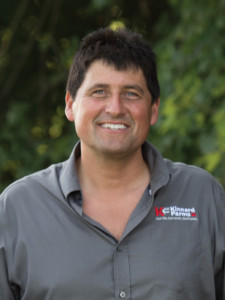
Lee Kinnard
Ever since I could remember, I tagged along with mom around the farm. She was the cow person and taught me everything she knew. I was a good student, but when I started school at UW-Madison, I couldn’t wait to get back home, where you know your neighbors and where everybody stops and says hello when they pass each other on the road.
I came home after just a semester and jumped right back into the farm. We were milking about 140 cows, and I loved every minute of it. I already had lots of ideas of how to keep mom and dad’s progressive vision going while trying new approaches to provide our cows with the best there is in comfort and provide more jobs in our community. I also helped bring in one of the first cow care consultants, a dairy cow nutritionist. We were one of the first farms to do this and still continue to be progressive in making sure our cows have whatever it takes to make them comfortable.
As mom and dad discussed the future, I told them, “I want to do this forever.” I’ve never looked back. After dad passed, it was Rod, Maureen, mom and me. Mom was my best friend and my greatest cheerleader.
I think she knew, just like I do, that I was born to do this. And, today, when I keep on trying to find a better way to do something, whether it is getting the best quality milk, or testing the soil to find the perfect nutrient balance, I think of her. I know she’d be proud of what we’ve built here. The look of the farm is changing, however mom’s values remain the same.
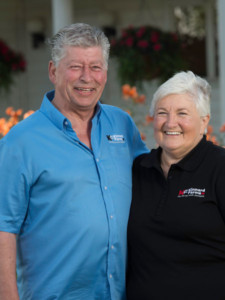
Rod & Maureen Kinnard
Maureen Kinnard has been married to her husband, Rod, since 1970. “We were married in a warm August, and back then August meant combining oats. Rod’s parents worked in the milking parlor that day so we could enjoy the wedding. Some friends had offered us their cottage up north for a honeymoon. But the next morning we woke up and Rod said, ‘I don’t think we can get away.’ We never did make it up north. But it’s okay. It’s part of farming.”
For Rod, the Kinnard farm is home. “As a kid, I always loved being on the farm. But my teachers told me, ‘You’re smart, you shouldn’t be in farming.’” I spent two years at Marquette studying to be a doctor and two more at River Falls. But the truth is, what mom and dad were doing on the farm was more progressive than what they were teaching at the UW. So I came back and said, ‘Dad, I’d like to farm.’”
Rod and Maureen kept the farm growing and continued to find ways to do things more efficiently. “Maureen and I were having dinner,” remembers Rod. “At the time we were milking about 100 cows. I said to her, ‘Someday, I’m going to milk 1,000 cows. I know we can do it, and we can do it well.’”
The couple and their cousins, who owned a cement company, helped build a new milking parlor in 1976, and Rod and Maureen mixed the concrete by hand. “There were long days and struggles,“ says Rod. “But we always take pride knowing we’re producing food. That somewhere in the world, someone didn’t go hungry because we did the right thing.”
“A lot of people are on our shoulders now,” adds Maureen. “We keep trying to make the farm better, more sustainable. It’s just an extension of what Alvin and Milly always did.”
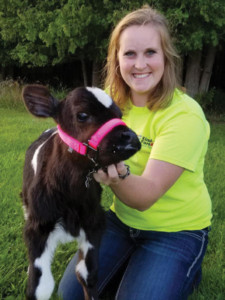
Amanda Hintz
We make cow comfort and health a top priority, 24 hours a day, seven days a week, 365 days a year. Our dedicated team of employees works around the clock, led by our herd manager, Amanda Hintz.
Growing up on her family’s beef farm in Oconto, Amanda knew from an early age that she wanted to work in the agricultural industry. At 12 years old she saw a news story on milking cows, and she turned to her dad and told him that is what she wanted to do. Shortly after, Amanda began working on a friend’s dairy farm and started showing cows through her local 4-H program. Her passion for dairy cows and the dairy industry continued to grow throughout high school, and, as she began applying to college, she knew she wanted this to be her future career.
Amanda attended the University of Wisconsin-River Falls to study dairy science and agricultural business. While pursuing her degree, she worked as the calf manager on two dairy farms near the university. As graduation neared, Amanda began looking for herdsman positions on dairy farms. In April 2016, Amanda accepted a herdsman position on our farm and was promoted to her current position of herd manager
in June.
As herd manager, Amanda oversees the health and well-being of the cows. She also manages her team of eight employees who help her perform daily visual examinations of each cow and record their observations in a computer software program that tracks each cow’s activity. If the team notices an abnormality in the daily activities (walking, eating, milking) of a cow, they perform a more thorough examination. Amanda and her team will work together to create a plan to return the cow to prime health.
Amanda cares for our cows at all times of the day, if needed, because she lives across the street from the farm. “I like living near the farm because it feels like home to me. Hearing the hustle and bustle as the sun comes up and being a part of something bigger is humbling,” says Amanda. “Knowing that I take a small role in helping feed the world makes me proud.”
Amanda pays special attention to the calves that need a little extra care, like her new preemie calf she has named Sweet Pea. Along with Sweet Pea, she also has two dogs, two goats and a cat. Amanda cares for the cows on our farm just as she cares for her pets at home—with a passion and enjoyment that makes her happy to go to work every day.
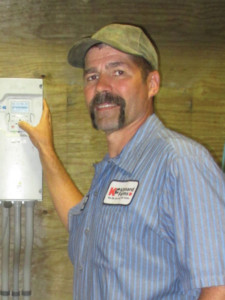
Marty Thiry
Marty Thiry grew up one mile away from Kinnard Farms. Lee Kinnard and Marty had been talking for years about Marty joining the team at the farm. In January, Marty became the Sand Facility Manager. Now, instead of commuting to Green Bay, he has a two-minute drive to work.
After 25 years working swing shift at Georgia-Pacific, Marty wanted more quality time with his wife, Sue, and their teenage children. Missing their high school activities was no longer an option.
“I mainly work days at the farm,” said Marty. “I actually work more hours now than I did at the mill, but I have quality time with my family. Lee is flexible if I have to leave early to get to one of their games.”
Marty manages the equipment in the sand recycling facility along with four other employees. “Everyone on the farm focuses on innovation,” said Marty.
In the sand facility, augers separate the sand from the original mixture of manure, sand and recycled water. The augers convey the sand, which is still dirty at this point, to a sand washer. The washers scrub the sand clean using recycled water that has been captured from the cleaning of our milking machinery. After drying, the sand is clean and infinitely reusable.
“Reclaiming the sand is good for the environment, but to make it suitable for the cows is a challenge,” said Marty. “It can’t be too wet, so we dry the sand using a sand dryer — the first of its kind ever installed anywhere in the world.”
“There’s more to come as far as processing the manure, such as extracting the water and being able to re-use this water on the farm. When you solve a problem, it really makes you feel good.”
“When we expanded and modernized the farm, I was hoping we would be lucky to attract people like Marty,” said Lee. “He grew up here. He loves the area. His values are our values.” “I have an old farmhouse, my kids have pigs and chickens, and my wife also grew up on a farm,” said Marty. “I love the country. I would never move to a city … not even a small city like Casco or Luxemburg. We have our little spot, and we wouldn’t move away for anything.”
